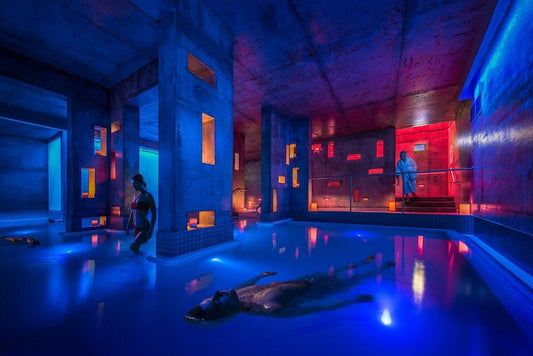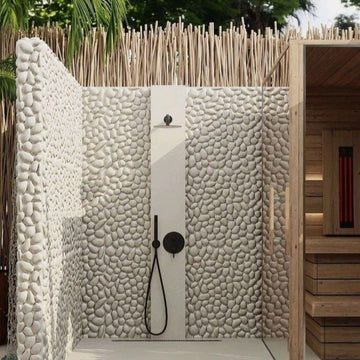Are Saunas Good For Your Skin? Sauna Benefits From A Derm

Are Saunas Good For Your Skin: Dermatologist Tips
After a long day or an intense workout, stepping into a steamy traditional sauna (or infrared sauna) is a great way to unwind and relax. Not only is it deeply relaxing, but the numerous benefits associated with regular sauna use are also extensively studied and well-documented. For instance, can sauna sessions contribute to calorie burning? Or will it help to reduce cardiovascular risk and be good for your heart? How about is a sauna good for muscle recovery after a workout? That they are.
One common question many may not ask "are saunas good for your skin?"
Lets listen to see what Dr. Andrea Suarez, MD, FAAD a board-certified dermatologist has to say about using a sauna for healthier skin.

Medical disclaimer: This article is intended for educational and informational purposes only. It is not intended as a substitute for medical advice. For health advice, contact a licensed healthcare provider.
Understanding the Benefits of Sauna for Skin
Deep Cleansing
Saunas, whether infrared or traditional, are renowned for their ability to purify the skin deeply. The heat generated in saunas opens up the pores, allowing impurities, dirt, and toxins to be expelled through sweat. This deep cleansing action is particularly beneficial for individuals with acne-prone or congested skin, as it helps to prevent breakouts, reduce pore congestion, and promote clearer skin.
Improved Blood Circulation
One of the most significant benefits of sauna sessions is their ability to enhance blood circulation. The heat from saunas induces vasodilation, causing the blood vessels near the skin's surface to expand. This increased blood flow delivers oxygen and essential nutrients to the skin cells, promoting cell renewal, repair, and rejuvenation. As a result, you'll notice a brighter, more vibrant complexion with regular sauna use, along with improved skin texture and tone.
Stimulation of Collagen Production
Collagen is the primary structural protein in the skin responsible for maintaining its firmness, elasticity, and youthful appearance. Sauna sessions stimulate collagen synthesis, helping to minimize the appearance of wrinkles, fine lines, and sagging skin. The increased collagen production also improves skin hydration, firmness, and resilience, leaving your skin looking smoother, plumper, and more youthful over time.
Exfoliation and Detoxification
In accordance to a study published in the International Journal of Environmental Research and Public Health, sweating profusely in the sauna acts as a natural exfoliant, removing dead skin cells and promoting cell turnover. This gentle exfoliation reveals a fresh, radiant complexion, smooths skin texture, and reduces the appearance of imperfections such as acne scars and hyperpigmentation. Additionally, sweating aids in detoxification by flushing out toxins, impurities, and excess sebum from the skin, leaving it feeling cleansed, refreshed, and revitalized.
"when it comes to saunas and increased blood circulation, whenever you have a little bit of increased blood flow to the skin it can definitely make your skin appear more glow, more radiant and it can help with skin turnover." said Dr. Andrea Suarez.

Potential Negatives to Skin Health and How to Mitigate Them
Dehydration
The intense heat and sweating in saunas can lead to dehydration if adequate fluids are not consumed. To prevent dehydration, it's essential to hydrate before, during, and after your sauna session. Drink plenty of water or electrolyte-rich beverages to replenish lost fluids, maintain hydration levels, and support overall skin health.
Skin Irritation
Individuals with sensitive skin may experience redness, irritation, or even heat rash from prolonged exposure to sauna heat. To avoid skin irritation, limit your sauna sessions to a moderate duration (typically 10-15 minutes) and opt for lower temperatures. Applying a soothing moisturizer or aloe vera gel after your sauna session can help calm any inflammation, soothe irritated skin, and restore the skin's natural barrier function.
"the act of sweating for the skin is actually very irritating" said Dr. Andrea Suarez. "sweat pulls water out of our skin which naturally make the skin dry and it becomes hyper irritable, making it [the skin] become impaired."
Saunas May Not Be Ideal for Sensitive Skin Types
If you have pre-existing skin conditions such as eczema, rosacea, or dermatitis, it's essential to approach sauna use with caution and consult with a dermatologist or healthcare professional before incorporating it into your skincare routine. They can provide personalized advice, recommend suitable sauna types and session parameters, and address any concerns or sensitivities related to your skin condition.

Tips for Your Skin After Using Sauna to Help Improve Skin
A relaxing sauna session can do wonders for your dry skin and promote overall health and wellness. However, to fully maximize its benefits without any adverse effects, there are a few essential steps you should include in your post-sauna regimen:
- Gradual Build-Up: Start with shorter sauna sessions (around 10-15 minutes) and gradually increase the duration and temperature as your tolerance improves. Listen to your body and take breaks as needed to avoid overheating, dizziness, or discomfort.
- Hygienic Practices: Use a clean towel to sit on and avoid direct contact with sauna surfaces to prevent the spread of bacteria, germs, and infections. After your sauna session, rinse off with a cool shower to remove sweat, impurities, and toxins from the skin's surface. Follow up with a moisturizer or hydrating serum to replenish lost moisture, lock in hydration, and protect the skin barrier.
- Personalized Approach: Consider your individual skin type, preferences, and sensitivities when choosing sauna types (traditional or infrared) and session parameters (temperature, duration). Infrared saunas, for example, offer a gentler heat that may be more suitable for sensitive skin or individuals with heat-sensitive conditions.
Are Saunas Good For Your Skin? Last Thoughts

So, are saunas good for your skin along with the host of other potential benefits?
Dr. Andrea Suarez notes that studies are inconclusive on the subject due to not enough studies, however mentioned that there is the potential for saunas sessions to offer a multitude of benefits for your skin, from deep cleansing and improved circulation to collagen stimulation and detoxification.
A summary for the potential benefits of sauna bathing to skin health:
- Improves blood circulation and blood flow
- Increases collagen production
- Provides detoxification
- Removes sebum and dead skin cells from your body
The heat from the sauna also offers an anti-inflammatory effect, which helps alleviate symptoms related to skin conditions such as psoriasis, eczema, atopic dermatitis, and others, but we'll save that for another article!
So, step into the sauna, embrace the heat, and let your skin reap the rejuvenating rewards of this ancient wellness practice. With patience, consistency, and mindful self-care, you can unlock the transformative power of sauna sessions and elevate your skincare regimen to new heights of health and vitality.
Are Saunas Good For Your Skin? All the FAQ's
Q: Are saunas beneficial for your skin?
A: Yes, saunas can actually be great for your skin! The heat and steam in saunas help to open up your pores and can remove impurities from your skin, resulting in a clearer complexion.
Q: How does spending time in a sauna benefit your skin?
A: Spending time in a sauna can help increase blood flow to your skin, which can lead to a healthier complexion and make your skin look brighter and more radiant.
Q: Can saunas help with unclogging pores?
A: Potentially, yes, the heat of the sauna can help to unclog your pores by opening them up and allowing sweat and impurities to be released from your skin.
Q: How long should you stay in a sauna for skin benefits?
A: It's undetermined for exact figures, but generally, two 15-minute sauna sessions can be beneficial for your skin. It's important to listen to your body and not overdo it, especially if you have sensitive skin.
Q: Can saunas be beneficial for all skin types?
A: While saunas can benefit many skin types, individuals with very sensitive skin may need to be cautious as the heat and steam can sometimes aggravate certain skin conditions.
Q: Are infrared saunas specifically good for the skin?
A: Infrared saunas have been found to deliver heat more deeply into the skin, which can result in your skin glowing with a rosier complexion and experiencing better overall skin health.
References
- Courtesy of Dr. Andrea Suarez, MD. FAAD dermatologist comments on Sauna & Skin Benefits? Infrared, Finnish. Steam
- de Miranda RB, Weimer P, Rossi RC. Effects of hydrolyzed collagen supplementation on skin aging: a systematic review and meta-analysis. Int J Dermatol.





